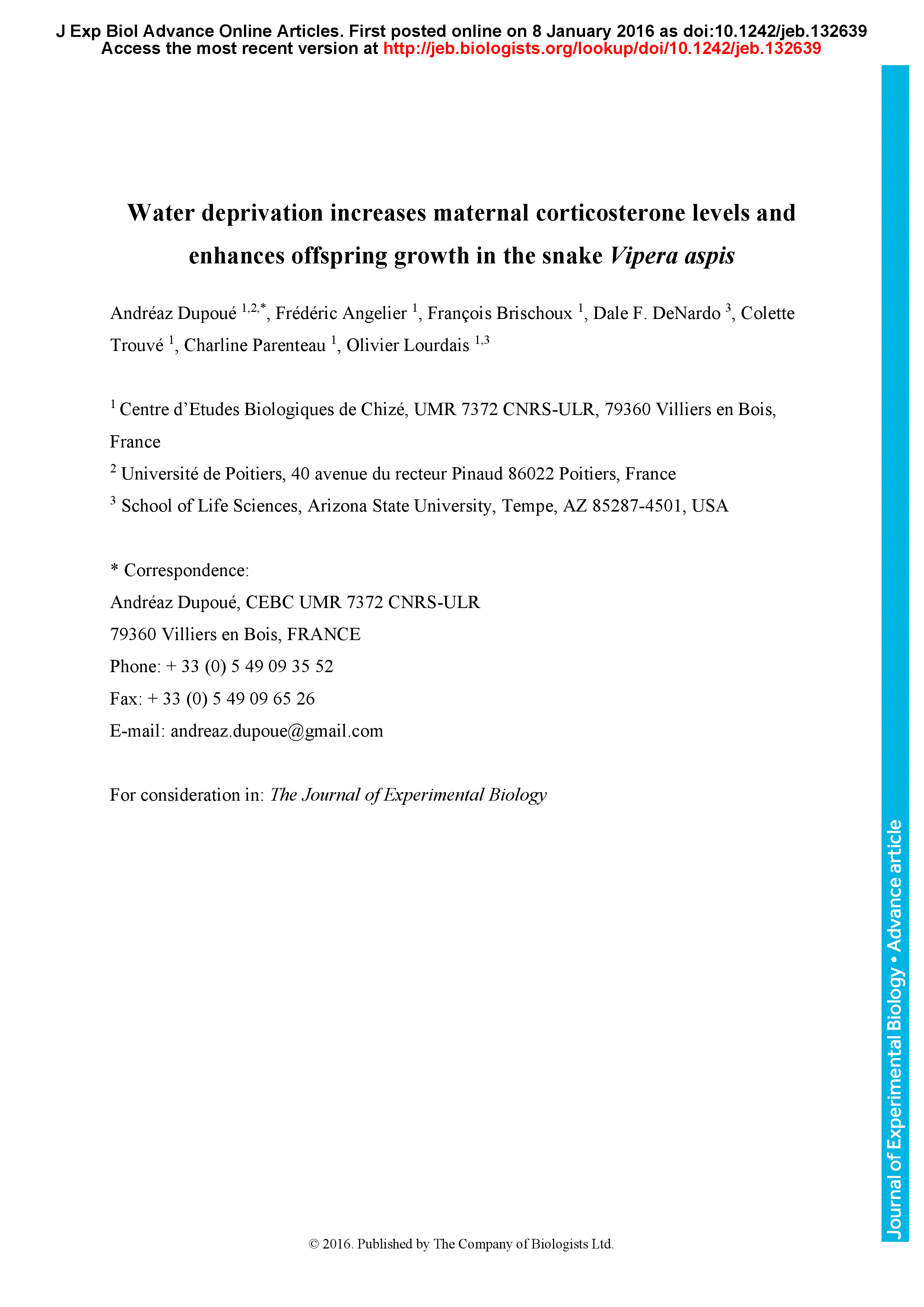Circulating glucocorticoids (GCs) levels may increase as a result of reproductive effort or in response to unpredictable events. However, the GCs secretion can vary with the availability of vital trophic resources such as energy. While water represents another critical resource, the impact of water deprivation on GCs secretion during reproduction has not yet been thoroughly investigated. Here, we examined the effects of water deprivation on plasma corticosterone (CORT) concentrations of female aspic vipers (Vipera aspis), and we determined the impacts of water deprivation on offspring traits. We exposed both pregnant and non-reproductive females to a 20-day water deprivation and compared their pre- and post-deprivation CORT levels to those of control females. At the end of the treatment, only water-deprived pregnant females showed a significant increase in CORT levels. In pregnant females, changes in baseline CORT level were correlated to changes in female hydration state. Changes in baseline CORT levels were also negatively influenced by maternal reproductive effort in pregnant control females, while such relationship was not apparent in pregnant water-deprived females. Finally, we found that offspring from water-deprived females had higher growth rates than offspring from control females. Offspring growth was also positively correlated to changes in both maternal osmolality and baseline CORT levels. Together, our results suggest that dehydration increases maternal CORT levels which may subsequently influence offspring development. Further long-term field studies are therefore required to assess whether there is an adaptive significance of this response.
Water deprivation increases maternal corticosterone levels and enhances offspring growth in the snake Vipera aspis
Currently Viewing Accepted Manuscript - Newer Version Available
- Split-screen
- Views Icon Views
- Open the PDF for in another window
-
Article Versions Icon
Versions
- Version of Record 01 March 2016
- Accepted Manuscript 01 January 2016
- Share Icon Share
-
Tools Icon
Tools
- Search Site
Andréaz Dupoué, Frédéric Angelier, François Brischoux, Dale F. DeNardo, Colette Trouvé, Charline Parenteau, Olivier Lourdais; Water deprivation increases maternal corticosterone levels and enhances offspring growth in the snake Vipera aspis. J Exp Biol 2016; jeb.132639. doi: https://doi.org/10.1242/jeb.132639
Download citation file:
Advertisement
2023 JEB Outstanding Paper Prize shortlist and winner

The JEB Editors are delighted to announce the shortlisted authors for the 2023 JEB Outstanding Paper Prize. Read the winning paper - Tiny spies: mosquito antennae are sensitive sensors for eavesdropping on frog calls - by Hoover Pantoja-Sanchez and Brian Leavell from Ximena Bernal's lab at Purdue University, USA.
JEB Science Communication Workshop for ECRs

If you’re an early-career researcher interested in science communication and are attending the SEB Annual Conference in Prague this summer, come a day early and join the JEB Editors at a sci comm workshop to learn the key writing skills needed to promote your research to a broad audience beyond your peers (1 July at 14.30-17.30). Places are limited to 24 attendees, and applicants should apply through the SEB registration page by 30 April 2024.
Bridging the gap between controlled conditions and natural habitats in understanding behaviour

Novel technologies enable behavioural experiments with non-model species, in naturalistic habitats and with underexplored behaviours. In their Commentary, Scholz and colleagues discuss how to obtain a deeper understanding of the natural ecology and lifestyle of study animals.
Beluga metabolic measures could help save species

To help save animals from extinction, it’s important to understand what each species needs to survive. This led Jason John et al. to measure the metabolic rates of captive belugas to develop a ‘fish calculator’ showing that the whales need to eat ~23 salmon per day.
ECR Workshop on Positive Peer Review

Are you an ECR looking for tips on how to write concise, astute and useful manuscript reviews? If so, join the JEB Editors at a 2-hour JEB-sponsored Workshop on Positive Peer Review at the Canadian Society of Zoologists annual meeting in Moncton on 9 May 2024 at 13.00-15.00. There are 25 spaces for ECRs and selection is first come, first serve. To sign up, check the ECR Workshop box when you register for the CSZ meeting.



